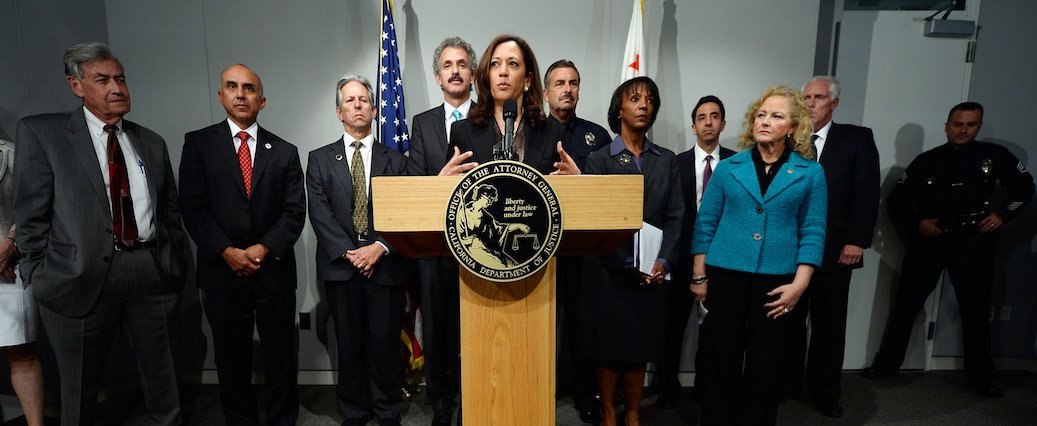Throughout her brief presidential campaign, Vice President Kamala Harris has highlighted her extensive background in criminal justice, a career that includes roles as a lawyer, district attorney, and the attorney general of California.
Our latest survey finds that Americans have largely positive attitudes toward occupations that work with the criminal justice system — such as social workers and police officers. Within that overall positive context, Americans' views of the specific roles Harris has filled — including as an attorney general and prosecutor — are slightly less positive.
Harris has framed the presidential election as one between a prosecutor and a felon. Voters are less sure how they see the matchup between Harris and Trump. While we've found that Americans are far more likely to believe that Trump is a criminal than that Harris is, a larger share also think that Trump is tougher on crime. And, by a slim margin, more believe Trump would be better than Harris at handling crime as president.
Many criminal justice policies that Harris has supported or helped enact during her career are popular among both Democrats and Republicans. This includes her previous initiatives to address truancy and provide nonviolent offenders with job training, as well as proposals she may attempt to enact as president, such as setting a national standard for police use of force.
Most Americans think that the criminal justice system is too lenient on many criminals, particularly those who have committed financial crimes — such as political corruption and corporate fraud — or personal crimes, such as child abuse, sexual assault, and domestic violence. Illegal immigration is the most divisive form of crime: Most Democrats view the system's current response as too harsh or about right, and most Republicans characterize it as too lenient.
Feelings toward jobs in law enforcement and criminal justice
More Americans have positive than negative feelings toward many occupations that operate in the realm of criminal justice. Of those asked about, the professions viewed most favorably are forensic scientists (78% have very or somewhat favorable opinions of them), social workers (71%), police officers (68%), and highway patrol officers (63%). Beyond professions, police dogs (76%) and juries (69%) also are generally viewed positively.
Jobs previously held by Harris are perceived somewhat less favorably than others included in the survey. Harris began her career as a lawyer, an occupation which 51% of Americans have a positive opinion about. Continuing her legal career, she was a prosecutor as the District Attorney of San Francisco from 2004 to 2011; 53% of Americans have a favorable view of district attorneys, and 51% do of prosecutors. From 2011 to 2017, Harris was the attorney general of California; 48% are favorable toward attorneys general. The only less popular occupations in the survey than the four Harris held are parking enforcement officers (46%) and CIA agents (47%). (Beyond professions, police unions also are relatively unpopular with only 45% favorable toward them.)
Democrats are significantly more likely than Republicans to have favorable opinions of roles previously held by Harris, including attorneys general, district attorneys, and prosecutors. Social workers, public defenders, and agents for the FBI, Secret Service, and CIA also all rate higher among Democrats.
More Republicans than Democrats favorably rate sheriffs, border patrol agents, and police officers. Police dogs and police unions also are more popular among Republicans.
On the presidential campaign trail, Harris has touted her record as a prosecutor. But what do Americans think of that record? Many Democrats think that as a prosecutor, she was fair (57%), and about half say she was tough on crime (48%), when choosing from any of 10 possible ways to describe her. 30% of Democrats describe her as each of the following: ambitious, progressive, and compassionate. Republicans, on the other hand, are more likely to describe Harris as ineffective (50%), corrupt (49%), and inconsistent (43%). Just 5% of Republicans or fewer say Harris was each of the following: tough on crime, fair, and compassionate.
Positions on criminal justice policies
To understand what Americans think about Harris' record in criminal justice, we compiled a list of 20 policies that she has supported or played a role in enacting. Most of them, we find, are very popular. All but one — abolishing the death penalty — are strongly or somewhat supported by majorities of Americans. Harris' record on the death penalty has been mixed: She now advocates for its abolition nationally, but at times upheld California's death penalty laws as the state's attorney general. 33% of Americans support abolishing the death penalty and 47% oppose doing so.
One of Harris' signature programs as the district attorney of San Francisco, Back On Track, served as a reentry initiative aimed at reducing recidivism for first-time nonviolent offenders. 85% of Americans are in favor of creating job training and rehabilitation programs for people convicted of nonviolent crimes.
In response to protests against police brutality, Harris pushed for requiring law enforcement to disclose data on officers’ use of force, as well as statistics on the number of officers injured or killed on duty. Requiring these disclosures is supported by 79% and 76% of Americans, respectively.
Many of the policies asked about are supported by bipartisan majorities, meaning at least half of both Democrats and Republicans. The largest partisan gaps are on the creation of an environmental justice unit (81% of Democrats and 45% of Republicans support it) and the abolition of the death penalty (supported by 49% of Democrats and 14% of Republicans).
Views on how the justice system responds to crime
Large shares of Americans think that the U.S. criminal justice system treats many types of criminals too leniently — especially those committing political corruption (72%), child abuse (66%), sexual assault (65%), human trafficking (62%), and domestic violence (59%), among 30 crimes asked about.
Marijuana use and prostitution are the only two crimes that more say are addressed too harshly than too leniently. Half of Americans say marijuana users are treated too harshly, while just 16% say they are treated too leniently. 34% think prostitution is addressed too harshly, compared to 18% who think the criminal justice system's responses are too lenient.
Views on how the criminal justice system treats people who enter the U.S. illegally are divided by party: 77% of Republicans and just 16% of Democrats think responses to illegal immigration are too lenient.
Republicans also are more likely than Democrats to say the system is too lenient toward people who commit drug trafficking, burglary, shoplifting, and gang violence.
Democrats are more likely than Republicans to say that people who commit police brutality, hate crimes, and environmental crimes are treated too leniently by the criminal justice system. They also are more likely to say this about tax evasion, embezzlement, and corporate fraud.
Crimes for which Democrats and Republicans have similar views about the justice system's response are antitrust violations, war crimes, driving while intoxicated, animal cruelty, and sexual assault.
Related:
- Harris vs. Trump: How Americans evaluate them on personality and policy
- True crime: How does the genre affect Americans?
- Half of Americans enjoy true crime, and more agree it helps solve cold cases
- Guilty or not guilty: How Americans judge two dozen famous criminal defendants
— Carl Bialik contributed to this article
See the results for this YouGov poll
Methodology: The poll was conducted online among 2,232 U.S. adult citizens on two separate surveys from July 31 - August 4, 2024 and August 6 - 9, 2024. A random sample (stratified by gender, age, race, education, geographic region, and voter registration) was selected from the 2019 American Community Survey. The sample was weighted according to gender, age, race, education, 2020 election turnout and presidential vote, baseline party identification, and current voter registration status. Demographic weighting targets come from the 2019 American Community Survey. Baseline party identification is the respondent’s most recent answer given prior to November 1, 2022, and is weighted to the estimated distribution at that time (33% Democratic, 31% Republican). The margin of error for the overall sample is approximately 3%.
Image: Getty








